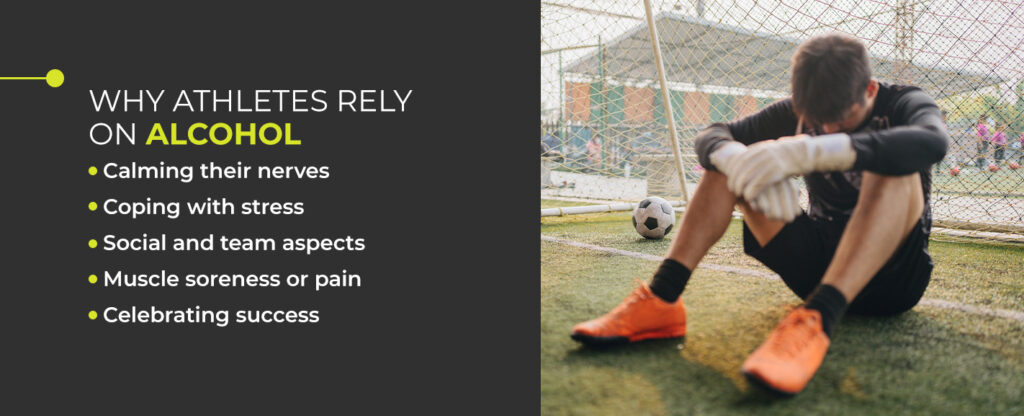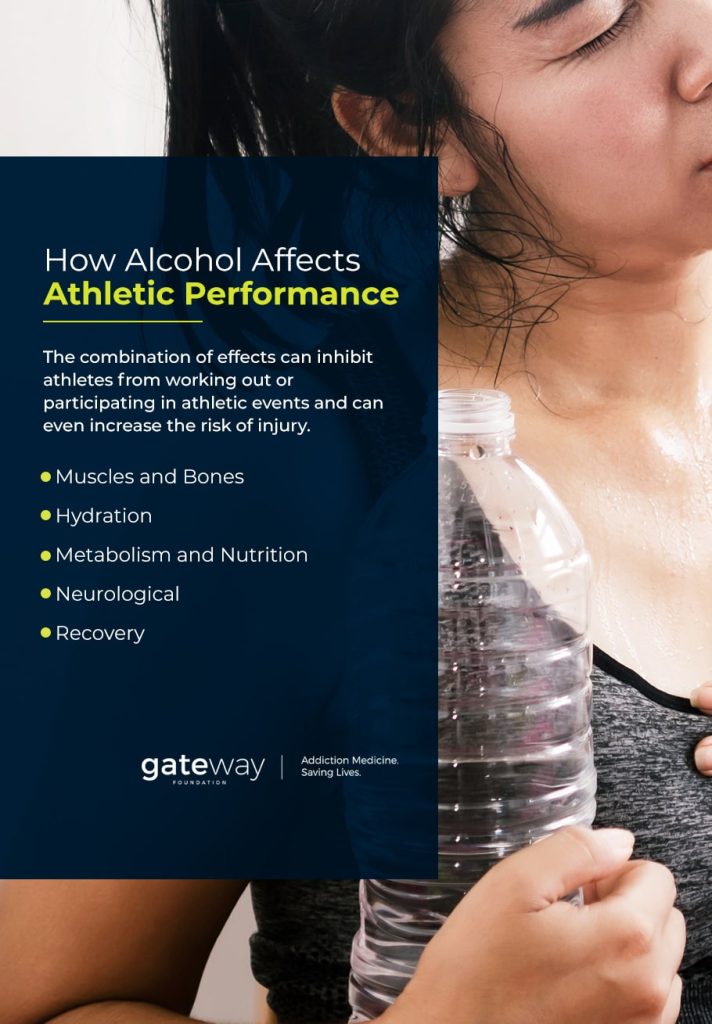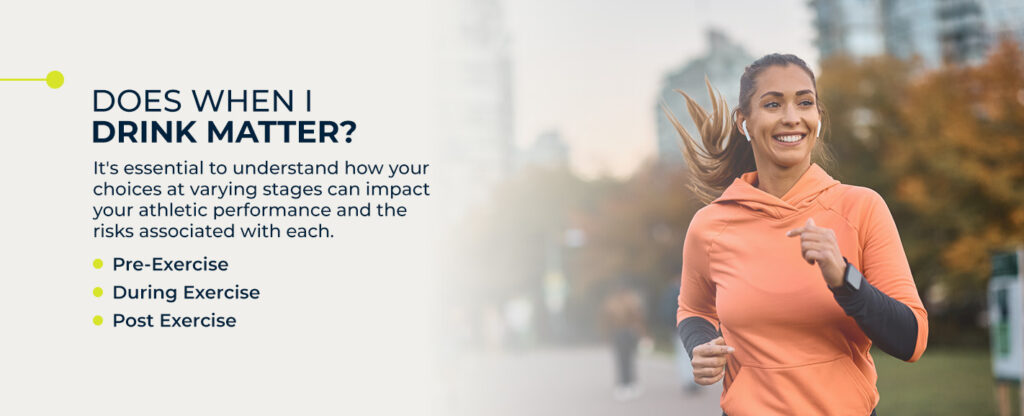- Feb 21
- AddictionAlcohol Addiction Treatment
Alcohol is the most commonly used drug in the United States. It’s readily available and sensationalized by the media. Some people begin drinking as adolescents or teens. The prevalence of alcohol and our current culture puts specific people at risk of developing a substance use disorder.
Drinking alcohol affects various communities in different ways. Some people use it to cope with their mental health conditions, while others use it for chronic pain. Athletes have a unique risk for alcohol consumption due to the culture surrounding drinking, especially in college athletics. Sports and alcohol never go together, but many athletes rely on alcohol for various reasons.

Why Athletes Rely on Alcohol
Alcohol consumption among student-athletes is also higher than among non-athletes. As many as 53.3% of student-athletes binge drink within a given month, while non-athletes binge drink at a rate of 41.2%. While athletes and non-athletes consume alcohol with approximately the same frequency, athletes tend to engage in higher levels of alcohol consumption. Binge drinking as a student-athlete increases the chances of developing an alcohol use disorder, which can persist later into life.
Athletes rely on or consume alcohol for numerous reasons.
- Calming their nerves: Athletes commonly experience nerves ahead of games or events. The night before, they may drink to reduce their anxiety. However, excessive drinking can impact their athletic performance.
- Coping with stress: Aside from anxiety related to athletic performance, athletes experience other stressors that contribute to drinking. These stressors include finances, personal relationships, work or child care. Student-athletes might have additional stress related to their education. Alcohol is a temporary means of relieving stress, but continued pressure can increase the risk of developing an AUD.
- Social and team aspects: Social networking with friends is crucial for maintaining happiness and preventing loneliness. Athletes have an established social group with their teammates, and bonding with them is a way to develop communication skills among the team. Some athletes use alcohol as a way to bond with other athletes, whether that’s going out to a bar or attending a party. When new members join the team, they may experience peer pressure or hazing that influences them to drink alcohol.
- Muscle soreness or pain: Feelings of muscle soreness or discomfort after a workout or intense physical activity are typical due to a buildup of lactic acid, but some athletes turn to alcohol to help manage the pain. While alcohol may bring temporary relief, it can also cause additional lactic acid buildup, especially with chronic drinking. The extra lactic acid creates muscle soreness and discomfort once the pain-reducing effects of alcohol have worn off. Dehydration from alcohol can also prevent your body from eliminating lactic acid.
- Celebrating success: Winning a game or making strides at sporting events is a cause for celebration. Many athletes consume alcohol during these celebrations and may binge drink, which can lead to blackouts and an increased risk of injury.

How Alcohol Affects Athletic Performance
Many athletes consume alcohol without much thought about how it affects their overall performance. Alcohol impacts each part of the body differently. The combination of effects can inhibit athletes from working out or participating in athletic events and can even increase the risk of injury.
Muscles and Bones
Toned muscles and strong bones are crucial to a powerful athletic performance. Athletes spend a lot of time ensuring their bodies are in peak physical condition. However, drinking alcohol can significantly impact muscle and bone health.
Misusing alcohol can cause muscle cramps, pain and weakness. Even using alcohol short-term can inhibit muscle growth. Many athletes rely on strength, either for bodybuilding or improving their overall athletic performance. When they drink alcohol, they risk impacting their ability to build muscle and perform as an athlete.
Long-term use can also impact bone growth and the body’s ability to repair bone tissue, making injuries more likely and affecting the body’s ability to repair damage.
Athletes who misuse alcohol increase their likelihood of a sports-related injury. The inability to heal quickly can put an athlete out of commission longer than expected. Participating in athletics while drinking can also result in multiple injuries, which can cause lifelong damage that prevents athletes from participating in sports or physical activity for the rest of their lives.
Additionally, habitual alcohol consumption impairs the immune system. When the immune system isn’t functioning correctly, it can be challenging to recover from illness and injuries. A weak immune system also increases the chances of getting ill, which will prevent athletes from participating in sporting events.
Hydration
Alcohol is not adequate for replacing lost fluids. Alcohol is a diuretic, meaning it eliminates fluids from your body through the liver, kidneys and bladder faster than other fluids. Drinking can speed up dehydration, which is part of what causes hangovers the following day. Dehydration from alcohol can affect multiple parts of the body.
- The brain: Alcohol consumption, especially long-term, can affect your cognitive functioning and decision-making abilities. Athletes need to think clearly to make calls and coordinate with their teammates.
- The liver and kidneys: Alcohol damages the liver and kidneys. When alcohol consumption compromises these organs, results could include high blood pressure and an inability to flush toxins from the body. Athletes with kidney or liver damage may find it challenging to engage in high levels of physical activity.
- The muscles: Binge drinking or drinking over a long period can cause stiffness in your muscles and even a loss of muscle mass. Athletes rely on their muscles to function properly to aid in their performance. If their muscles are too stiff to move or their muscle mass decreases, they may not perform as well as they could.
Proper hydration is essential for peak athletic performance. Physical activity already causes the body to lose fluids, so drinking only increases the rate of dehydration, impacting athletic training.
Metabolism and Nutrition
Alcohol has little to no nutritional value. Consuming alcohol gives the body empty calories, increasing weight gain without providing any health benefits. On top of providing no nutritional value, alcohol can inhibit nutrient and vitamin absorption. Nutrients are vital to the proper function of our body’s various systems.
- Vitamin B1: This vitamin plays a crucial role in metabolizing carbohydrates. All athletes are familiar with stocking up on carbohydrates for energy before a big game to keep them at peak performance. Drinking alcohol limits the absorption of B1, which can prevent carbohydrates from giving athletes the energy they need.
- Vitamin B12: This vitamin is responsible for maintaining our red blood and nerve cells. Alcohol consumption prevents the absorption of vitamin B12, and chronic drinking can create a deficiency. A vitamin B12 deficiency can cause muscle weakness, fatigue, difficulty walking and a fast heart rate. These symptoms can significantly impact athletic performance and other aspects of a person’s life.
- Folic acid: Folic acid helps our blood cells form and promotes healthy cell formation and function. Alcohol can prohibit the absorption of folic acid, and if someone goes a long time without enough folic acid, it can cause a disease called megaloblastic anemia. This disease limits the amount of oxygen a person can carry in their body, impacting their endurance and stamina. Athletes rely on endurance to maintain quality performance.
- Zinc: Zinc plays various roles in the body, such as maintaining a healthy metabolism, immune system and wound healing. Consuming alcohol drains the amount of zinc in the body, which can make a person fatigued. Athletes will experience impacted endurance and performance and slowed recovery from muscle aches, soreness and athletic injuries.
While a person might be getting the right amount of vitamins through their diet, alcohol consumption can limit the absorption of these vitamins, creating problems with athletic performance.
Alcohol also affects the liver, which plays a role in the function of metabolism. When we drink alcohol, our bodies convert sugar into fatty acids, but the liver can’t metabolize them correctly. The liver mainly handles the metabolism of fats, so the sugars in alcohol and mixed drinks can cause weight gain, particularly with beverages like beer that contain many empty calories.
Weight gain can impact athletes in multiple ways. Wrestlers may have difficulty cutting weight for competition, and extra weight can limit a track or cross-country runner’s endurance.
Neurological
Alcohol can significantly impact the brain and central nervous system. Drinking the night before or during a game can slow your reaction time and decrease hand-eye coordination, which is essential in all athletic activities. As a result, your balance and fine motor skills may suffer.
You may not communicate with your teammates efficiently and react poorly when someone passes a ball or an opposing player comes charging in your direction. Alcohol abuse also adversely affects memory capabilities, making it challenging to recall plays made by your team or essential rules of the game.
Alcohol is a depressant, so it slows breathing and lowers body temperature. Excessive amounts of alcohol can make these effects more severe and potentially life-threatening. Long-term alcohol use can cause more severe neurological effects, such as brain damage.
Recovery
Recovery is part of many athletes’ lives. They might sustain an injury from physical activity or experience muscle soreness or pain from exercise. Managing injuries and soreness is essential to continue performing at their peak.
Misusing alcohol can make it challenging to recover from injuries or physical exertion. Alcohol consumption weakens the immune system, which can slow a person’s recovery and put an athlete out of commission for an extended period.
Alcohol use also affects hormones that are essential to recovery, such as insulin and testosterone. An athlete who drinks before or after a workout or game may feel sore longer, affecting their ability to perform at their next athletic event.

Does When I Drink Matter?
Drinking at different times will have various impacts on athletic performance. It’s essential to understand how your choices at varying stages can impact your athletic performance and the risks associated with each.
Pre-Exercise
Drinking the night before exercising can impact your performance. Your endurance will be lower than usual, and you may experience hangover symptoms, including:
- Nausea and vomiting
- Headaches
- Fatigue
- Muscle aches and pains
- Dehydration
Hangovers have earned the apt nickname the “self-inflicted flu.” These uncomfortable feelings can prevent you from performing at your best. You’ll notice a slower reaction time and imbalanced hand-eye coordination. In some cases, hangovers can prevent you from participating in athletic events altogether.
Drinking the night before can also impact your sleep. A lack of sleep or disturbed sleep can cause difficulty concentrating, increased blood pressure and an elevated heart rate. These symptoms can significantly impact an athlete’s ability to perform at their best.
During Exercise
Alcohol is a depressant, so drinking it ahead of a workout will slow your reaction time and adversely affect your coordination and balance. Working out with these effects can pose a potential danger and decrease the results you’re looking to achieve.
Additionally, drinking before you work out or participate in a sporting event will increase dehydration. Working out already causes the body to lose fluids, which you can replace by drinking water. Replacing the fluids your body loses decreases the chance of experiencing symptoms such as:
- Dizziness
- Nausea or vomiting
- Muscle cramps
- Fast heart rate
- Headache
Since drinking to excess can cause many of these effects anyway, further dehydration from alcohol will compound these and lead to more severe symptoms, such as confusion, weakness, lethargy and loss of consciousness.
Post Exercise
Some athletes choose to drink after they exercise or play a game. They may do so to cope with muscle soreness or injury resulting from their physical activity, or to celebrate with teammates. While alcohol can bring temporary relief from muscle soreness and pain, it prevents your body from healing efficiently.
Drinking alcohol increases the hormone cortisol rather than testosterone, which will impact the muscular gains from a workout. Rather than gaining and toning muscle, an athlete may see little to no changes if they drink each time they finish a workout.
Binge or chronic drinking can increase your parathyroid hormone levels. This vital hormone is necessary for the regulation of calcium, which promotes bone health. However, when the parathyroid hormone exists in excess, it can deplete too much calcium from the bones, increasing the risk of fractures. It also prevents bones from healing adequately after an injury. Alcohol can increase your risk of severe injury, limiting an athlete’s ability to participate in sporting events or workouts.
Contact Gateway Foundation for Alcohol Addiction Treatment
Addiction affects your health, personal relationships and performance, whether at work or on the field. The long-term effects can impact quality of life and prevent people from participating in activities they once enjoyed.
Treating addiction can help you or a loved one regain control and lead a healthier lifestyle. Gateway Foundation uses evidence-based treatment methods and a personalized continuum of care to treat your needs with the best chance of success. Contact us to learn more about our treatment options and take the first step toward recovery.



